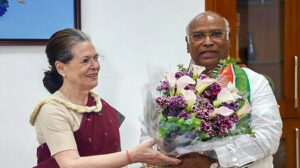 Moon Desk : India’s Congress party has elected the experienced Dalit leader Mallikarjun Kharge as its president. The first “non-Gandhi” to hold this post in 25 years, the veteran Congressman defeated diplomat-turned-politician Shashi Tharoor by a resounding majority. Of the total 9,385 votes cast, Kharge received 7,897 votes. Tharoor still surprised many by bagging 1,072 votes. Some 416 votes were declared invalid.
Moon Desk : India’s Congress party has elected the experienced Dalit leader Mallikarjun Kharge as its president. The first “non-Gandhi” to hold this post in 25 years, the veteran Congressman defeated diplomat-turned-politician Shashi Tharoor by a resounding majority. Of the total 9,385 votes cast, Kharge received 7,897 votes. Tharoor still surprised many by bagging 1,072 votes. Some 416 votes were declared invalid.
Stating that “the process of revival of Congress has truly begun,” Tharoor has assured Kharge of all support.
I wrote in a recent article in The Diplomat that “The Congress party is hopeful that with a new incumbent who does not belong to the Gandhi family as Congress President, it will blunt the attacks of political opponents accusing the Gandhis of having a stranglehold over the party.”
That Kharge had the full support of the Gandhis was evident when outgoing President Sonia Gandhi, who has led the party for 22 years, and her daughter Priyanka Gandhi Vadra visited Kharge’s home to congratulate him after his victory. Rahul Gandhi, who is in the midst of a countrywide long march, the “Bharat Jodo Yatra” (Unite India March), congratulated Kharge and lauded him for his “experience and ideological commitment” as well as his “democratic vision.”
Kharge has been vocal and consistent in his criticism of the fascist and communal policies of India’s ruling Bharatiya Janata Party (BJP) and the Sangh Parivar, a grouping of Hindu right-wing organizations of which the BJP is a part.
Eighty-year-old Kharge is a grassroots politician who has risen up the ranks from being a labor union leader to occupying the top post in the 137-year-old Congress party. The son of a poor mill worker, he was the first in his family to go to college and get a law degree.
Kharge made a habit of winning elections; he was elected to the Karnataka State Assembly nine times consecutively, between 1972 and 2008. Thereafter, he was elected a Member of Parliament in 2009 and 2014 and served as a minister in former Prime Minister Manmohan Singh’s cabinet.
However, he lost the 2019 elections but returned to the upper house of Parliament in 2020.
Following his election as Congress party president, the BJP took a swipe at Kharge by alleging that he will be “remote controlled” by the Gandhis. When questioned by reporters on his future role with a new Congress boss at the helm, Rahul said that he would “report to the new President.” “The new President will decide my role,” he added.
As party president, Kharge has enormous challenges ahead.
The Congress party won only 44 seats in 2014, when it lost power to the BJP, and then marginally increased its tally to 53 seats in the 2019 general elections. The Congress vote share has also been steadily declining and now stands at only 19.5 percent, while the BJP vote share is a whopping 37.5 percent. Along with its allies, the BJP has a nearly 45 percent vote-share.
The Congress will have to focus on reclaiming its support base. Kharge has little time to do this. General elections are due in another 18 months.
At present, Congress is in power in just two states, Rajasthan and Chhattisgarh, where it is running the state governments. If the party needs to have even a fighting chance in 2024, it will need to win several of the upcoming assembly elections.
Nearly a dozen states will be going to the polls in the 18 months before the general election. The Congress is a strong contender to win elections in Himachal Pradesh, Karnataka and Rajasthan.
As party chief, Kharge needs to strengthen state Congress units and curb factionalism to effectively take on the BJP.
If there is something that Congress needs to learn from the BJP, it is its clear focus on winning elections and always being battle ready. It must not shun its secular ideological ethos.
Kharge is faced with multiple challenges as party president but the most critical is the task of bridging the inter-generational divide within the party. In the past eight years, several leaders both junior and senior, have quit the party and joined the BJP. The fact that Tharoor got 12 percent of the votes indicates that there is a section within Congress that wants dynamic and youthful leadership. The organizational man that Kharge is, he is best suited to accommodate this segment. Kharge already promised during his campaign bid that he will give 50 percent of posts to youth in the party.
Senior leaders have welcomed the smooth transition of the party leadership. A senior Congress leader, who did not want to be named, told The Diplomat that “while Kharge is party president, Rahul is undoubtedly the most popular Congress leader and therefore the face of the party in the elections.” “Rahul Gandhi is the Congress’ prime ministerial candidate,” he said, without mincing words.
Congress leaders reject speculation that the party will now function with “twin power centers.” Instead, most leaders see the two roles of Kharge as party president and Rahul as the Congress’ face as distinct, strengthening the party when the two work in tandem. As Congress leader and former minister Mani Shankar Aiyar told The Diplomat, “Throughout Congress history, whenever the two have worked in sync, the party has flourished.”
Kharge will have to adroitly navigate the Gandhis’ hold over the party while shaking off the lethargy that had crept in within the party organization. This will be a tall task. While thanking Sonia and Rahul, Kharge said he would “continue to look to them for guidance.” Congress insiders assert that seeking guidance from an experienced Sonia will only help strengthen the organization.
Will a new party president and the success of the Bharat Jodo Yatra rejuvenating the party cadre spell the beginning of a new era for Congress and boost its capacity to take on the BJP? Only time will tell.





